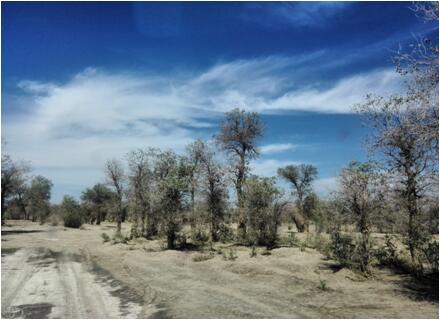Scientific Efforts to Help Protect Ecosystem in Southern Xinjiang
2016-12-16
Populus euphratica, also known as Euphrates poplar or desert poplar, is always found in ecosystems along river valleys in arid and semi-arid regions. It is especially tolerant of saline and brackish water.
However, even with its strong drought and saline-alkali resistance, the species is facing a devastating situation in southern Xinjiang, especially the Kongque River Basin, due to heavy decrease of water level in this area.
The last two decades have seen large scale of land and water resources exploitations in southern Xinjiang, including reservoir. Long time cutoff and frequent dryout in Kongque River led to death of large areas of vegetation. Ecosystem along the Kongque River Basin based on Populus euphratica was suffering degradation.
Efforts are made to protect and even restore the ecological environment. Scientists from the Xinjiang Institute of Ecology and Geography are joining to help with the task. CHEN Yaning and his team carried out a series of field survey on vegetations in the Kongque River Basin, as well as measurements and samplings of underground water.
Their study led to a set of water transfer plan and ecological restoration measures. About 117.3 million cubic meters of water was diverted from the Bosten Lake and the Tarim river to compensate the Kongque River this autumn.
Scientists proposed to initiate a water resources planning in southern Xinjiang, and establish a joint and cooperated mechanism for the management and protection of the ecosystem in this area.
“Diversity of species is declining in the region. The desert riparian forest ecosystems are facing severe damages along the Kongque River. A systematic and effective ecological protection project became urgent, if we hope to stop the history from repeating itself,” said CHEN.

Populus euphratica seriously degenerated(Imaged by XIEG)



